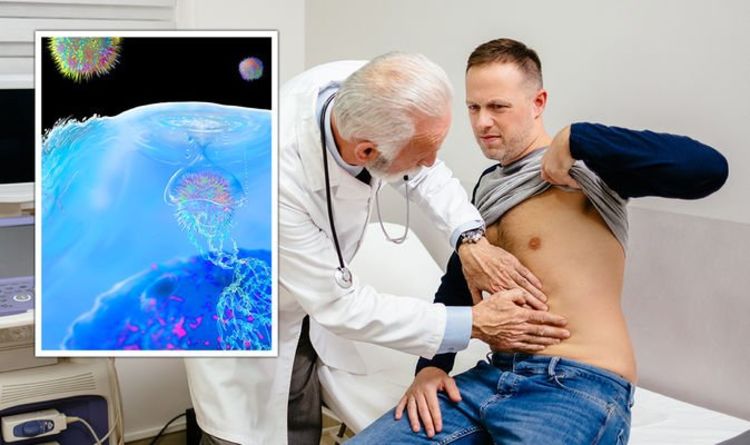Stomach cancer: Surgeon explains the symptoms
We use your sign-up to provide content in ways you’ve consented to and to improve our understanding of you. This may include adverts from us and 3rd parties based on our understanding. You can unsubscribe at any time. More info
One sensation that may be attributed to stomach cancer is feeling “full very quickly” when eating, the national health service (NHS) pointed out. Another possible indication is a loss of appetite. These two sensations are not the only possible warning signs of stomach cancer. The disease may also lead to other bodily sensations, notably:
- Heartburn
- Acid reflux
- Nausea
- Indigestion
- Tiredness
- Stomach pain.
A lump may also be felt at the top of the stomach, and issues might occur when trying to swallow.
People who suffer from gastro-oesophageal reflux disease may experience such symptoms on a regular basis.
This may lead to complacency, whereby the symptoms no longer lead to concern and are consequently brushed off as insignificant.
“It’s important to be checked by a GP if your symptoms change, get worse, or do not feel normal for you,” the NHS noted.

There are times, however, when you are advised to “see a GP” to make sure anything sinister is not brewing.
Examples include problems swallowing or a lump in your stomach. You are also recommended to seek medical advice if you have “lost a noticeable amount of weight over the past six to 12 months without trying”.
Any other symptoms of stomach cancer that does not improve after two weeks should also be investigated by a medical professional.
While such symptoms can be attributed to a number of conditions, seeking medical assistance can determine the root cause.
The NHS added: “It’s important to get [your symptoms] checked by a GP. This is because if they’re caused by cancer, finding it early makes it more treatable.”
Medical checks might include a faeces or urine sample, touching of the stomach, and a referral for further tests at a hospital.
An urgent referral to a hospital usually means you will have an appointment within two weeks following your doctor’s appointment.
At this stage, further testing will be a precautionary measure – and it does not mean you definitely have cancer.

How to reduce your risk of stomach cancer
To minimise your risk of stomach cancer, the national health service recommends being a non-smoker.
Another tip is to lose weight if you fall into the overweight or obese category, which can be achieved by consuming less calories and exercising more every day.
When it comes to dietary considerations, limiting the amount of salt you eat will also be beneficial to your health.
As would cutting down on alcohol, red and processed meat, such as: ham, bacon, and salami.

There are certain factors that can’t be changed, however, that do increase your risk of stomach cancer.
Such factors include: being over the age of 50; being a man; and having a family history of the disease.
People who suffer from severe acid reflux, gastritis or pernicious anaemia are also at heightened risk of cancer developing in the stomach.
Fortunately, stomach cancer is “not very common in the UK”.
Source: Read Full Article
